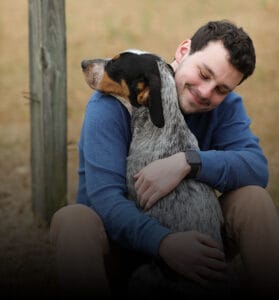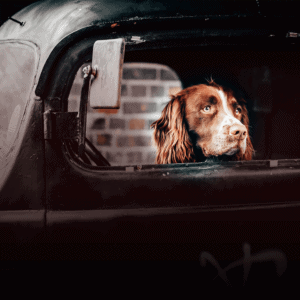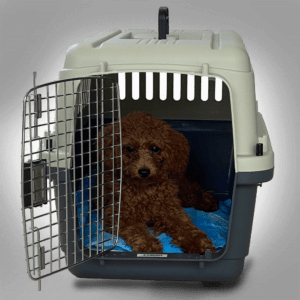Buying a puppy from a puppy breeder can be a daunting prospect – especially for new puppy parents.
First, “puppy farms” generally have bad reputations for the mistreatment of dogs.
Then there is the risk of spending lots of money on a puppy to end up rushing to the vet every couple of weeks with numerous health problems.
It’s not all bad news though.
There are plenty of responsible and experienced puppy breeders out there that know what they’re doing and take excellent care of dogs and pups.
You just need to know what to look out for.
What to check with a puppy breeder before buying a puppy
If choosing a purebred puppy, it’s important to do some research first to find out about common health conditions associated with the breed.
A prime example is the Pug breed, which is as famous for its quirky looks as its health problems.
Common issues include breathing problems, chronic or frequent inflammation of the brain, diabetes and spina bifida.
In fact, it’s estimated that one in four purebred dogs are afflicted with genetic health conditions. Some animal welfare organisations, like PeTA, even advise against buying a purebred dog for this very reason.
However, there are ways to check a purebred puppy is healthy before taking it home.
Health and background checks
First, ask the breeder about the background and health records of the parents and previous litters.
A responsible puppy breeder should be able to provide this information without delay and without appearing offended. If they can’t, it’s a red flag.
Next, ask for proof of any necessary health certificates.
Again, a reputable breeder should be able to provide this. Many breeders even include this evidence in puppy packs for new owners without being asked.
With crossbreed puppies, some breeders will say there is no need for a health certificate of the parents because crossbreeds don’t have the same health issues as purebreds.
But this is not correct and crossbreed pups can still inherit genetic conditions from their parents – so always ask for proof.
Finally, never buy a puppy without being able to view the mother or the rest of the litter first. If the stud dog (father) is not there, ask for contact details of the owner.
Another warning sign to look out for is if the mother appears scared or nervous of the pups. If this happens, then she might not be the mother, which means the breeder is not being honest.
And if the mother appears unwell or has a bad temperament, then this is big alarm bell.
Walk away and look elsewhere for a puppy.
Where are the puppies being raised?
A key part of checking whether a puppy breeder is reputable or not is by visiting the facilities where the mothers and puppies are being kept.
Ask yourself these questions:
- Is the place well-lit and ventilated?
- Do the mother and the puppies look clean and happy?
- Is there enough space for the litter to move around and play?
- Is the property safe and secure?
A red flag is a strong smell of urine or faeces. This means the place is not regularly cleaned, which can lead to many health issues.
Do breeders let you pick your puppy?
An important question to ask a breeder is whether you will get to choose your puppy.
Some breeders are happy for you to choose your own, whereas others will suggest which puppy you should choose.
Others might have even selected the top pedigrees in the litter to become show dogs but will still use the puppies as examples of the breed and quality of the litter.
The best approach is to always ask if you can choose, and if not, ask why. A top quality breeder should always give you an honest answer.
If you can pick your own puppy, experts recommend not going for the bold puppy that chooses you (the one that runs over straight away).
This is because it could be the litter bully and might grow up to be dominant or aggressive towards other dogs.
Similarly, a quiet puppy at the back of the litter could grow into a shy and fearful dog.
Instead, think about what you want from a dog by asking yourself the following questions:
- Do you have children in the house?
- Do you have a garden?
- Will your dog work on a farm?
- Are you looking for a puppy to cuddle up with on the couch?
- Are you looking a potential hiking/running buddy in the future?
The answers to these questions will help you identify the personality traits to look out for when visiting a litter.
What if there are only a few puppies left?
Some people are put off when there are only two or three puppies left in case it means there is something wrong with them.
Often, the opposite is true, and they are actually much more rounded puppies from spending longer with their mother.
An extra couple of weeks with mum means puppies will have learnt about pack hierarchy and will recognise you as the alpha. Plus, they will have better social skills and will know how to act around other dogs.
Most importantly though, trust your gut instinct when choosing a puppy and never feel pushed into making a decision by the breeder.
You can find out more about choosing a puppy from a breeder at The Kennel Club (UK), Right Paw (Australia) or at the American Kennel Club (US).
Find out more about raising a puppy by reading 6 things you need to know before getting your first puppy.


















